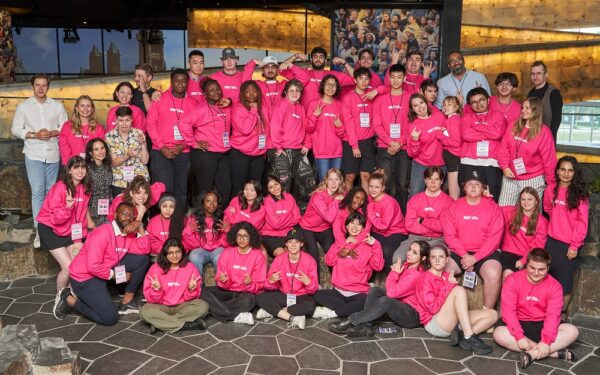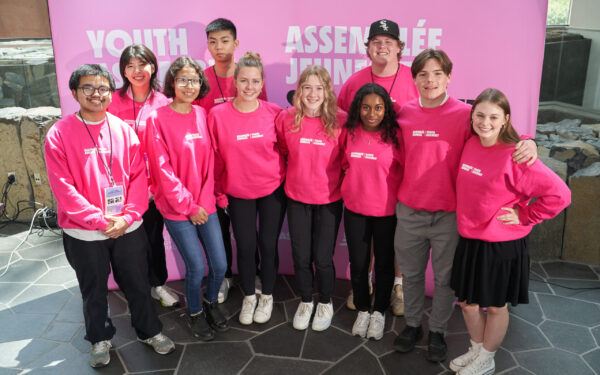Grants are one important way community projects get funded.
Brooklin Kennedy, 3rd year University of Ottawa student spending a co-op work term with CIRA during grants season, offers her advice to applicants. CIRA is also offering a webinar for applicants on March 8. If you’re interested, register here.
Grants are one important way community projects get funded. One thing my education in international development is showing me is that the funding space can be demanding, not always intuitive and anyone applying will welcome all the help they can get.
With CIRA’s grant call opening March 1st, I’ve put together some tips to help set you up for success.
Tip #1: Check your alignment
Making sure your project fits CIRA’s criteria is the most important step. Take the time to check your project idea against our four funding areas: digital literacy, cybersecurity, community leadership, and infrastructure. A handy directory of our projects funded to date, can be found on the “Find a Project” section of the CIRA Grants website. Cross-referencing the 2020/2021 projects we’ve funded against your project idea will help provide insight into our current funding priorities.
We’ve noticed in the past that two funding areas are not always well understood, so here’s some additional advice:
- Digital literacy projects must be focused on building digital skills. This funding area isn’t merely putting content online or using digital tools to do other things. Our focus is on the skill-building aspect.
- Community leadership projects are focused on building understanding and engagement in how the internet works (or should work) in Canada – this can be research, convenings or reports for example, but not for networking platforms that are for shared community interests.
If you still have questions after reviewing the CIRA Grants website, you can send a note to [email protected] to ask any questions about alignment.
Once you determine that your project is aligned to our funding areas, CIRA’s Evaluation Criteria is the next place I recommend you focus your attention. This set of criteria is what our Community Investment Evaluation Panel uses to decide which projects are funded.
The following tips will give you a quick overview of the five main criteria.
Tip #2: Tell us who’s involved
Who is leading your project? Why do they think it is needed? How was it conceived? Who had a role in putting the ideas together? Your project proposal should show who has developed the project and how they are connected to the beneficiary community. For 2022, CIRA is prioritizing projects that benefit students and/or northern, rural, and Indigenous communities, so the panel will be looking to see how the beneficiary communities have played a role in the development of the project.
Tip #3: Best laid plans
Lay out a clear plan for the reviewers that demonstrates the project outputs are realistically achievable in your proposed timeframe. With 185 funded projects under their belt, CIRA’s Evaluation Panel is good at doing a reality check on project plans and knows when the information is too vague.
Show that you have the team and project experience to deliver. Demonstrating your track record from previous projects helps. Our panel wants to see that the organizational capacity is there to ensure the reality of the project meets the vision.
Tip #4: Money isn’t everything… but a clear budget sure helps
The budget you present tells the nuts-and-bolts story of your project. What people and tools do you need to get the job done? Provide as much detail as possible on the costs and units of measure in the budget template that CIRA provides.
The budget should be reasonable and appropriate to the scope of the project and your organization’s capacity to manage the funds. This will be assessed based on the accompanying financial documentation you are asked to provide. Namely, your most recent audited financial statements and your current operating budget.
Also, make sure to note which expenses you intend to use grant funding for—this can be indicated on the CIRA-specific expense section of the budget sheet. You can apply for grants up to $100,000, and there is one grant set aside for $250,000. It’s common that the funds required to fully implement your project are higher than CIRA’s grant limit and that is fine. CIRA welcomes, and in fact prefers, projects with multiple sources of revenue—whether that is from other funders, or from your own in-kind contributions.
One important note: IT equipment should make up no more than 25% of the project budget, except in the case of Infrastructure projects.
Tip #5: Engage your community
CIRA believes community engagement is critical to any project’s success. Our Evaluation Panel looks at all the ways the community will be involved including planning, benefitting and financing. The advice here is to have your proposal reflect how you’ve engaged the community, established relationships and involved local partners that provide the expertise you need to make your project a success.
Tip #6: Think long-term
Outcomes are the specific concrete results and changes you foresee for the community. Show us the tangible outputs as well as the anticipated changes the beneficiaries will experience. And when it comes to sustainability, CIRA looks for projects whose value and benefits will live on after the initial project investment. It’s important to show that you’ve thought through what becomes of the project outputs once the funding ends. Will people still have access to the benefits?
Sometimes people interpret sustainability to mean that you must have a plan for securing additional funding to keep the project going, but that is not the way we look at it. For CIRA, sustainability means that the project’s outputs, outcomes and benefits of make a lasting impact in some way. Of course, if yours is a multi-phase project, we are also keen to hear what you envision after you’ve received your prospective grant.
Tip #7: Apply early!
My final tip is the most emphatic one: apply early! Why? Because CIRA’s grants application process comes with a catch—we do an eligibility review as soon as your project is submitted. Once our deadline approaches on April 13 at 2 p.m. EST, your project will be deemed ineligible, should there be any issues with your documentation. While CIRA’s application process is simple and streamlined, we know that grant applications take time and effort, and we don’t want a last-minute application to cost you a brilliant project idea. Save yourself the stress and try to submit early and we will review and confirm your documentation. If anything needs work, we send it back. It is your responsibility to provide complete documentation by the deadline.
To recap, when you’re preparing your project this year, focus on the following: check project alignment, follow our evaluation criteria and take the initiative to apply early.
I hope this makes your application process less daunting and gives you the confidence to submit a standout application. For more information check out our website and if possible, sign up for our upcoming Grant Applicant Webinar in English on March 8th at 1PM.
Brooklin is a Grants Specialist with CIRA’s Community Investment Program. She joins CIRA on a co-op work term as a third year University of Ottawa student pursuing a degree in International Development and Globalization. She is especially interested in the non-profit funding field and the dynamics of funder-recipient relations.





